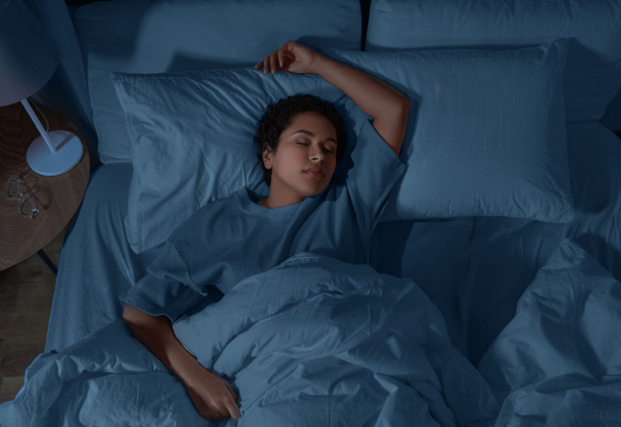Quality sleep is essential for maintaining good health and well-being, and it may even contribute to a longer life. Experts advise that adults should aim for seven to nine hours of sleep each night. For all these reasons, we want you to get a good rest (Harvard Health, 2023).
A guide to getting a good rest
Sleeping well is necessary. For this reason, we have decided to put together this guide that will help you to navigate those moments when rest really becomes elusive.
Create a restful environment
Your bedroom should be cool, quiet, and dark to contribute to sleep quality. Using blackout curtains could block out light, while a white noise machine or earplugs could reduce noise disturbances. A comfortable mattress and pillows also play a significant role in achieving restful sleep (Sleep Foundation, 2024).
Set a schedule to unplug from electronic devices.
Exposure to screens could interfere with your ability to fall asleep. To mitigate this, try to avoid screens in the evening and consider disconnecting from your electronic devices at least two hours before bedtime. Researchers at Harvard carried out an experiment comparing the effects of 6.5 hours of blue light exposure to green-light exposure of similar brightness. They concluded that blue light reduced the feeling of drowsiness (Harvard Health, 2020).
Stay physically active
Experts say that exercising during the day contributes to your sleep quality at night and boosts your mood. Try to incorporate exercise into your daytime routine at your own time! In addition, if you’re experiencing difficulty sleeping at night, you could try not to spend too much time in bed during the day. If you need to take a nap, you could try to keep it brief -under 30 minutes (Harvard Health, 2020).
Get some morning light
Regular morning light exposure could help shift our sleep schedule. If it’s possible, you might like to consider spending some time outside in the morning, as this could benefit your sleep hygiene (Sleep Foundation, 2024).
Set your bedtime
Your body could be inclined to sleep at specific times during the night. If you feel tired, but your mind is racing with thoughts, your body won’t be able to shut down and fall asleep. It might be beneficial to sit down with a pen and paper in the evening and jot down your worries; you could review this list in the morning to address any important concerns. If you have a bed partner, ask for their support in helping you maintain your schedule (Harvard Health, 2020).
Get a nice rest!
By applying these tips, you could significantly boost your sleep quality and well-being. A good night’s sleep is essential for physical and mental health, and small changes could make a big difference!
Sources:
ELS, L. C. (2024, June 25). Longevity: Lifestyle strategies for living a healthy, long life. Harvard Health. https://www.health.harvard.edu/staying-healthy/longevity-lifestyle-strategies-for-living-a-healthy-long-life
Harvard Health Publishing. (2020, July 7). Blue Light Has A Dark Side. Harvard Health. https://www.health.harvard.edu/staying-healthy/blue-light-has-a-dark-side
MPH, S. B., MD. (2020, March 27). Strategies to promote better sleep in these uncertain times. Harvard Health Blog. https://www.health.harvard.edu/blog/strategies-to-promote-better-sleep-in-these-uncertain-times-2020032719333
Pacheco, D. (2023, December 8). Bedtime routines for adults. Sleep Foundation. https://www.sleepfoundation.org/sleep-hygiene/bedtime-routine-for-adults
Pacheco, D., & Rehman, A. (2023). Bedroom environment: what elements are important? Sleep Foundation. https://www.sleepfoundation.org/bedroom-environment


